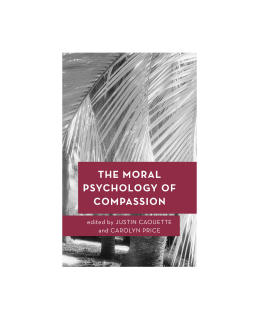
Additional Information
Book Details
Abstract
Compassion is widely regarded as an important moral emotion – a fitting response to various cases of suffering and misfortune. Yet contemporary theorists have rarely given it sustained attention. This volume aims to fill this gap by offering answers to a number of questions surrounding this emotion. These questions include: What is the nature of compassion? How does compassion differ from other emotions, such as empathy, pity, or gratitude? Is compassion a virtue? Can we have too much compassion? How does compassion influence other mental states (desires, motivations, beliefs, and intentions) and behaviour? How is compassion influenced by the environment? Must compassion be deserved? Can one be moral while lacking the capacity for compassion?
Compassion, like other emotions, has many facets – biological, social, psychological and neural, among others. The contributors to this volume will draw on a variety of disciplines and methods in order to develop a more systematic and comprehensive understanding of this often-neglected moral emotion.
Justin Caouette is a PhD Candidate in the philosophy department at the University of Calgary
(should have PhD by the time this book is complete). He is the co-editor of ‘Free Will and Moral
Responsibility’ (2013 CSP) and his research has been published in the American Journal of Bioethics
- Neuroscience, Southwest Philosophy Review, and numerous edited volumes. Regarding media
contacts, Caouette has a large following on Twitter as well as an active presence in the
philosophical blogosphere. He plans to highlight this book in multiple online forums.
Carolyn Price is a Senior Lecturer in Philosophy at the Open University.
She is the author of Emotion (Polity 2015) and Functions in Mind: A Theory of Intentional Content
(OUP 2001), She has published in a range of journals, including Inquiry, Pacific Philosophical
Quarterly, Nous, and Philosophical Studies.
Drawing on a variety of philosophical traditions and approaches, The Moral Psychology of Compassion is a valuable contribution to the literature on this important part of our moral lives. The volume contains essays exploring compassion's significance and utility for a variety of contemporary moral problems and philosophical debates, and will be of use to both scholars and students of moral psychology, applied ethics, and the history of moral philosophy.
Alexandra Plakias, Assistant Professor in the Department of Philosophy at Hamilton College
This is probably the most interesting and extensive collection of essays on compassion that I have seen. Chapters by well-known philosophers as well as interesting new voices are featured, and include treatments of compassionate motivation, compassion from a Buddhist perspective, compassion and practical reason, and applications of compassion in practical domains, such as health care, mental health care, and our relations with animals. It is enlightening as well as thought-provoking, and is a “must-read” for anyone who wishes to plumb the depths of compassion’s complexities.
Nancy E. Snow, Professor of Philosophy at the University of Oklahoma
Table of Contents
| Section Title | Page | Action | Price |
|---|---|---|---|
| Contents | 7 | ||
| Acknowledgments | 9 | ||
| Introduction | 11 | ||
| 1 The Moral Value of Compassion | 21 | ||
| 2 Appreciating the Virtues of Compassion | 35 | ||
| 3 Compassion and Animals | 53 | ||
| 4 Compassion and Consolation | 69 | ||
| 5 Compassion and Its Pitfalls | 81 | ||
| 6 Compassion and Practical Reason | 97 | ||
| 7 Buddhism and the Problem of Universal Compassion | 115 | ||
| 8 Compassion in Medicine | 133 | ||
| 9 Challenges and Opportunities for Compassionate Mental Health Care | 149 | ||
| 10 Compassion in the Workplace | 165 | ||
| References | 179 | ||
| Index | 195 | ||
| Notes on Contributors | 201 |
